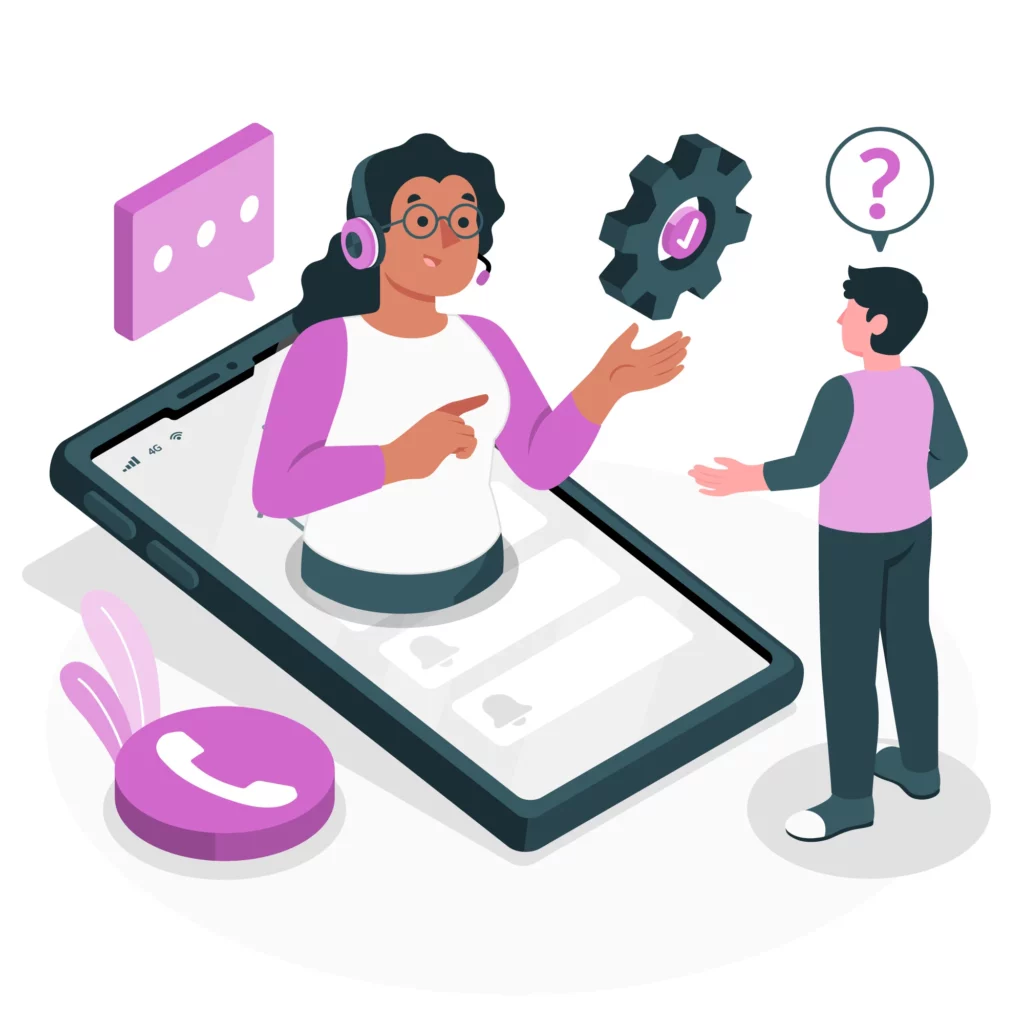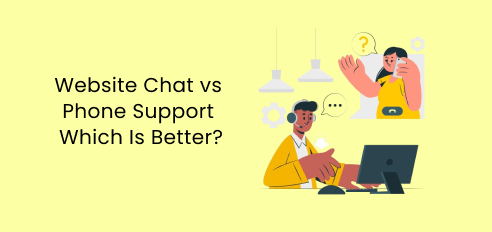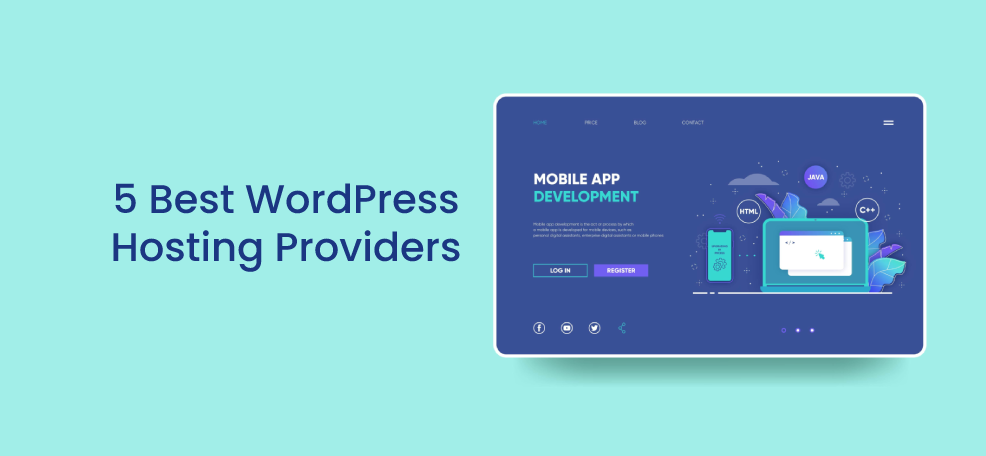As a business owner, you’re well aware of the importance of customer support in maintaining customer satisfaction and fostering loyalty. From emails and social media to website chat and phone support, the options are abundant, presenting you with a decision-making dilemma regarding the most effective method for addressing customer inquiries and resolving issues.
But which of these options is best for your business? Let’s explore and compare both website live chat and phone support to help you make an informed decision.

Website Chat Overview
Website live chat provides your business with a direct and immediate communication channel to engage with website visitors in real-time. Unlike traditional forms of customer support, live chat enables instant interaction between your customers and support agents through a chat widget embedded on your business’s website.
Here are some advantages of website live chat:
1. Real-time response: Live chat allows you to address customer inquiries promptly without the delays often associated with email or phone support. This immediate responsiveness enhances customer satisfaction and fosters positive experiences, leading to higher levels of customer loyalty and retention.
2. Multitasking capability for agents: Live chat empower your support agents to handle multiple customer conversations simultaneously, optimizing efficiency and productivity. Unlike phone support, where agents can only assist one customer at a time, live chat enables agents to manage several chat sessions concurrently.
3. Integration with automated solutions: Website live chat platforms often feature integration capabilities with automated solutions such as chatbots and AI-driven assistants. These automated functionalities streamline the customer support process by offering instant responses to common queries, triaging customer issues, and routing inquiries to the appropriate human agents when necessary.
When is Website Chat Right for Your Business?
Here are several scenarios where implementing live chat can be particularly beneficial for your business:
Real-Time Customer Assistance:
Live chat is ideal for your business if you prioritize real-time customer assistance. Whether customers have pre-purchase inquiries, require technical support, or need assistance navigating through products or services, live chat offers them immediate access to support agents who can address their concerns promptly.
Enhancing Website User Experience:
Your business can benefit from live chat if you aim to improve the user experience of your website. By offering on-demand support directly within the website interface, you can help visitors find information quickly, resolve issues efficiently, and ultimately increase user satisfaction and engagement.
24/7 Support Availability:
For businesses operating in global markets or serving customers across different time zones, live chat can facilitate round-the-clock support availability. By providing continuous access to support agents through live chat, your business can accommodate customers’ diverse schedules and preferences, ensuring that assistance is available whenever it’s needed.
Personalized Customer Interaction:
Live chat enables your business to deliver personalized customer interactions tailored to individual preferences and needs. Through live chat conversations, support agents can gather relevant information about customers’ inquiries, preferences, and purchase history, allowing for more personalized assistance and recommendations.
Cost-Effective Support Solution:
Compared to traditional phone support, live chat can be a cost-effective customer support solution for your business. Live chat allows support agents to handle multiple customer inquiries simultaneously, optimizing resource utilization and reducing overall support costs while maintaining service quality.
Data-driven Insights and Analytics:
Live chat platforms often provide valuable data and analytics capabilities that enable businesses to gain insights into customer behavior, preferences, and support channel performance. By analyzing chat transcripts, customer feedback, and performance metrics, you can identify trends, pinpoint areas for improvement, and optimize live chat support strategies accordingly.
Phone Support Overview
Traditional phone support operates on the dynamics of direct verbal communication between customers and support representatives via telephone calls. Phone support offers several advantages in customer support scenarios:
1. Human touch and personalized interaction: Phone support enables a more personal and empathetic connection between your customers and support agents compared to digital communication channels like live chat or email. The ability to hear tone of voice and express emotions facilitates a deeper understanding of customer concerns, allowing agents to provide tailored solutions and reassurance, thereby enhancing customer satisfaction and loyalty.
2. Complex issue resolution through dialogue: Phone support is particularly effective for addressing complex or nuanced customer inquiries that may require detailed explanations or troubleshooting steps. The interactive nature of phone conversations allows for fluid dialogue and the exchange of information in real-time, enabling support agents to guide customers through intricate issues, clarify uncertainties, and ensure comprehensive problem resolution.
3. Immediate assistance without digital barriers: Unlike digital channels that may encounter technical glitches or dependencies on internet connectivity, phone support offers a reliable and accessible means of immediate assistance without the barriers of digital technology. Customers can initiate support calls from any location with phone service, eliminating the need for internet access or familiarity with digital interfaces, making phone support inclusive and convenient for diverse customer demographics.

When is Phone Support Right for Your Business?
Here are several scenarios where implementing phone support can be particularly beneficial for your business:
Complex Issue Resolution:
Phone support is well-suited for addressing complex or sensitive customer inquiries that may require detailed explanations or nuanced discussions. By providing direct access to support agents via phone calls, your business can offer personalized assistance, walk customers through troubleshooting steps, and resolve intricate issues more effectively than through text-based communication channels.
Human Touch and Personal Connection:
Phone support allows your business to establish a human touch and build personal connections with customers through direct verbal communication. The ability to hear tone of voice, express empathy, and engage in dialogue fosters trust, reassurance, and a sense of rapport between customers and support agents, enhancing overall customer satisfaction and loyalty.
Emergency Situations or Urgent Support Needs:
In situations where customers encounter urgent issues or require immediate assistance, phone support offers a reliable and responsive means of communication. Whether it’s a technical malfunction, service outage, or critical product-related inquiry, phone support enables customers to connect with support agents quickly and seek timely resolutions to their pressing concerns.
Preferred Communication Channel for Certain Demographics:
Phone support may be the preferred communication channel for certain demographics, including older adults, individuals with limited internet access, or those who prefer verbal communication over digital channels. By offering phone support as an option alongside other communication channels, your business can cater to the diverse needs and preferences of your customer base and ensure accessibility for all segments of your audience.
Building Trust and Credibility:
Providing phone support signals a commitment to accessibility, accountability, and customer-centricity, which can help your business build trust and credibility with customers.
Factors to Consider Before Making a Choice
The choice of customer support channels is often influenced by various factors, including the nature of your business, demographics, technological capabilities, and financial constraints. Here are some key considerations for determining the most effective support channels for your business:
Nature of the business and industry norms: Consider the nature of your business and prevailing industry norms when selecting customer support channels. Industries may prioritize personalized, high-touch support channels like phone support to address complex inquiries and foster customer loyalty.
Demographics and preferences of target customer segments: Understand the demographics and preferences of your target customer segments to determine effective support channels. Generational differences, cultural norms, and geographic considerations can impact customer communication preferences.
Technological capabilities and infrastructure readiness: Assess your business’s technological capabilities and infrastructure readiness to support different customer support channels.
Balancing financial constraints and service quality objectives: Balance financial constraints with service quality objectives when choosing customer support channels. Consider operational costs, resource utilization, and the effectiveness of support channels in meeting customer needs.
Website Chat and Phone Support Hybrid Approach
Businesses are increasingly adopting omnichannel support strategies to meet evolving customer expectations and preferences. Integrating both website live chat and phone support can enhance your customer’s experiences and optimize support processes.

Here are some effective strategies for integrating website live chat and phone support:
– Unified customer profiles: Maintain unified customer profiles across different support channels to access relevant customer information and interaction history, enabling personalized assistance and continuity in customer interactions.
– Cross-channel communication: Implement cross-channel communication capabilities to allow customers to initiate conversations through one support channel and seamlessly transition to another if necessary, without losing context.
– Integrated ticketing and routing systems: Integrate ticketing and routing systems across multiple support channels to streamline the process of managing and prioritizing customer inquiries, optimizing response times, and ensuring consistent service levels.
Final Thoughts
As we conclude this article, it’s clear that there’s no one-size-fits-all answer. Website Live Chat offers real-time convenience, while Phone Support provides a personal touch. The key lies in understanding your customers’ preferences and needs. It’s also not merely a matter of ‘better’ but a strategic blend of both that creates a winning customer support experience. Consider implementing a hybrid structure that allows you to offer your customers the best of both worlds. This, in turn, will help you win more customers and turn your old customers into loyal brand ambassadors.
Considering a live chat tool for your support team? Sign up for free on Chatway today.









